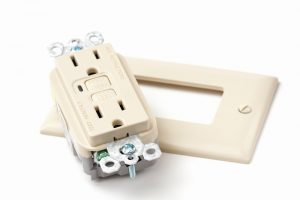 Your household’s electrical grid is easily one of the most important components in the living space. Each of your appliances requires this system to work—even gas-powered heaters use an electric starter. If your electrical system is malfunctioning, you can experience all kinds of problems.
Your household’s electrical grid is easily one of the most important components in the living space. Each of your appliances requires this system to work—even gas-powered heaters use an electric starter. If your electrical system is malfunctioning, you can experience all kinds of problems.
Safety is a concern, too, when your electrical system is malfunctioning. Electrical problems of any type can pose a serious threat to your living space, and to your family. Electrocution is a real threat, which brings us to our topic for this post—making sure you have the right outlets in place to protect your appliances, electrical equipment, and your home’s occupants.
How Outlets Protect You
Electrocution happens when there is a short circuit, which exposes a person to the electrical current. House fires are a common result of electrical current traveling in ways that it is not supposed to. We’re heading into spring and summer now, but when winter rolls back around it’s important to keep in mind that this is often caused by holiday lights and holiday parties requiring more electrical use.
No matter the time of year, one of the best ways to prevent hazards in the home is ensuring you have the right outlets installed by professional electricians.
- GFCI Outlets: GFCI stands for Ground Fault Circuit Interrupter, and these types of outlets monitor the electrical current flowing through it at all times. If that current suddenly starts flowing in a way it shouldn’t—like, into a person—the GFCI outlet activates and cuts off all the current flowing through it. This happens so fast that there’s never a harmful amount of electricity released. These outlets are meant to be installed in areas of the home that have water exposure, so the bathrooms, kitchen, and laundry area.
- AFCI Outlets: Standing for Arc Fault Circuit Interrupter, these outlets are similar to GFCI outlets, except that they protect against house fires. They do this by monitoring electrical flow throughout the system itself. If one of these outlets detects anything malfunctioning in the circuit, it breaks that circuit, in order to prevent further risk. These outlets are very useful in preventing many threats that electrical malfunctions can present.
Thorough Protection for Your Electrical System
Choosing the right outlets and having them professionally installed at the right locations is essential, but these outlets aren’t the only thing responsible for protecting your electrical system, you, and your home. Your electrical panel also serves as an important safety precaution. It should be checked then, at least once a year, to make sure it can still meet the demands being placed on it.
Generally speaking, electrical panels should be replaced every 30-40 years. However, even if you’ve added significant electrical components to your home in just the last few years, it might be worth it for you to begin looking into an electrical panel upgrade.
A whole-house generator installation is also a great consideration for you to make. In a major power outage, this will ensure that your appliances and systems can still run and operate as expected.
For expert service for your electrical in Hendersonville, TN, contact Covenant Heating and Cooling. “Dedicated to the Promise of Serving You!”
